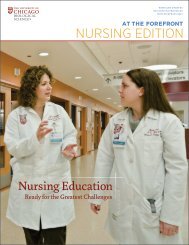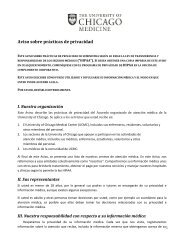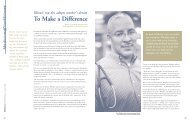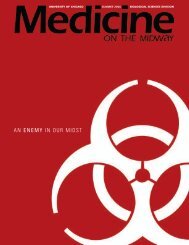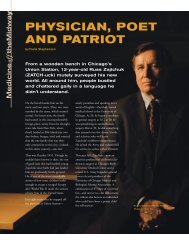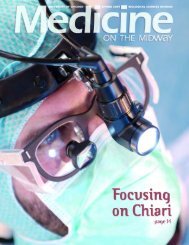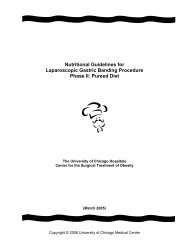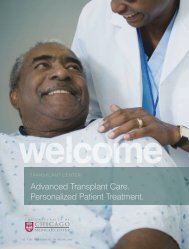Additional Program Highlights*Research•• Regulation of B cell fate commitment and immunoglobulinheavy-chain gene rearrangements by Ikaros. Harinder Singh, PhDand colleagues have provided novel insights into B cell developmentby identifying the critical role of the transcription factor Ikaros.Drs. John Cunningham (Molecular Genetics andHematopoiesis Program) and Susan Cohn(Clinical and Experimental Therapuetics Program)These investigators demonstrated that the transcription factor EBF restored the regeneration of CD19+ pro-B cells fromIkaros-deficient hematopoietic progenitors. These pro-B cells, despite having normal expression of key transcription factors,EBF and Pax 5, were not committed to the B-cell fate and failed to recombine variable gene segments at the immunoblobulinheavy-chain locus. Expression of Ikaros promoted heavy-chain gene rearrangements by inducing expression of therecombination-activating genes as well as by controlling accessibility of the variable gene segments compaction of theimmunoglobulin heavy-chain locus. Thus, Ikaros is a key regulatory component of the network that regulates B cell fatecommitment and immunoglobulin heavy-chain gene recombination (Reynaud et al. Nat Immunol 9:927-936, 2008).••••••••MDM2 SMP309 and TP53 Arg72Pro Interact to Alter Therapy-Related Acute Myeloid Leukemia Susceptibility(Intra- and Interprogrammatic). Kenan Onel, MD and colleagues, including Program 2 members Drs. Richard Larsonand Michelle Le Beau and Dr. Nathan Ellis (Cancer Risk and Prevention Program), have determined that polymorphismsin two DNA repair genes, MDM2 and TP53, interact to increase susceptibility to the development of therapy-related AML.This effect was observed in patients treated with chemotherapy who had loss of chromosomes 5 and/or 7, and acquiredabnormalities associated with prior exposure to alkylator chemotherapy, but not in patients treated with radiotherapy. Thesedata suggest that MDM2 and TP53 variants interact to modulate responses to genotoxic therapy and are determinants of riskfor t-AML (Ellis et al. Blood 112:741-749, 2008).Pretreatment C-Reactive Protein is a Predictor for Outcomes After Reduced-Intensity Allogeneic HematopoieticCell Transplantation (Intraprogrammatic). Andrew Artz, MD and co-investigators, Amittha Wickrema, PhD, LucyGodley, MD, PhD, Toyosi Odenike, MD, Elizabeth Rich, MD, PhD, Wendy Stock, MD, Richard Larson, MD and Koen vanBesien, MD described the independent prognostic impact of two commonly used biomarkers – C-reactive protein (CRP) andinterleukin(IL)-6 – on outcome following allogeneic stem cell transplantation. Using samples from patients who underwenta uniform reduced-intensity conditioning (RIC) regimen, they found that elevated CRP levels prior to allogeneic stem celltransplant were highly predictive of greater non-relapse mortality. Their results are of interest since they suggest that asimple pre-transplant blood test may be useful for predicting transplant tolerance (Artz et al, Biol Blood Marrow Transplant14:1209-1216, 2008).Genome-wide association study to identify novel loci associated with therapy-related myeloid leukemia susceptibility(Interprogrammatic). Kenan Onel, MD and colleagues, including Program 2 members Drs. Michelle Le Beau and RichardLarson and Dr. Nancy Cox (Cancer Risk and Prevention Program), examined whether the effect sizes of variants associatedwith t-AML would be greater than in sporadic cancer and whether these variants could be detected even in a modest-sizedcohort. In an association study using Affymetrix Mapping 10K arrays, they found a significant excess of associations overchance. The investigators genotyped the 10 most significantly associated single nucleotide polymorphisms (SNPs) in anindependent t-AML cohort and obtained evidence of association with t-AML for 3 SNPs in the subset of patients with loss ofchromosomes 5 or 7 or both, acquired abnormalities associated with prior exposure to alkylator chemotherapy. Their resultsdemonstrate that the effect of genetic factors contributing to cancer risk is potentiated and more readily discernable int-AML compared with sporadic cancer (Knight et al, Blood 113(22):5575-5582, 2009).Determination of outcomes for adolescents and young adults with acute lymphoblastic leukemia treated on cooperativegroup protocols (Intraprogrammatic). James Nachman, MD and co-investigators including Drs. Wendy Stock, JamesVardiman, and Richard Larson, performed a retrospective comparison of presenting features, planned treatment, complete36UCCRC SCIENTIFIC REPORT 2009* Due to space constraints, only a small representative sample of Program highlights is presented here.
emission rate, and outcome of greater than 300 adolescents and young adults with newly diagnosed acute lymphoblasticleukemia (ALL) who were treated on consecutive trials in either the Children’s Cancer Group (CCG) or the Cancer andLeukemia Group B (CALGB). While complete remission rates were identical, patients in the CCG group had significantlyhigher 7-year event-free and overall survival rates compared to those in the CALGB group. Comparison of the regimensshowed that CCG patients received earlier and more intensive central nervous system prophylaxis and higher cumulativedoses of nonmyelosuppressive agents. As a result of these findings, a prospective study for adolescents and young adultswith ALL using the more successful approach of the CCG has been initiated (Stock et al, Blood 112(5):1646-54, 2008).Selected New Funding•• The National Cancer Institute awarded Lucy Godley, MD, PhD and her colleagues R01 funding to understand themechanisms by which epigenetic alterations originate within cancer cells. Investigators are studying how expression ofthe DNMT3B gene, which encodes one of three methyltransferases, affects mouse development, methylation patterns andphenotypes of cancer cells, and DNA methylation. Results will likely provide a basis for novel diagnostic and therapeuticstrategies applicable to virtually all forms of cancer.Molecular Genetics& Hematopoiesis••••Michelle Le Beau, PhD is the primary investigator in a program project (P01), funded by the National Cancer Institute, tostudy the molecular mechanisms and genetic susceptibilities leading to therapy-related acute myeloid leukemia (t-AML)and myelodysplastic syndrome (t-MDS) that develop after cytotoxic treatment with drugs targeting topoisomerase II.The project aims to identify genetic variants that may be genetic risk factors or biomarkers for t-AML, somatic alterationsassociated with t-AML, and myeloid leukemia tumor suppressor gene(s) (TSG). These studies may lead, ultimately, to thedevelopment of individualized cancer prevention and early detection strategies, such as altered primary therapy. Coinvestigatorsinclude Drs. Richard Larson, Kenan Onel, and Theodore Karrison (Clinical and Experimental TherapeuticsProgram).Jianjun Chen, PhD has been awarded an R01 grant from the National Cancer Institute to determine the role andfunctional mechanisms of an miRNA cluster in leukemogenesis. MicroRNAs (miRNAs, miRs) are an abundant classof small non-coding RNAs that regulate diverse biological processes. Recent studies suggest that a cluster of miRNAs,the miR-17-92 polycistron located at 13q31, functions as an oncogene in various cancers. The project aims to determinewhether the miR-17-92 cluster plays an essential role in leukemogenesis and in proliferation and differentiation ofhematopoietic progenitor cells. These studies are likely to identify the critical leukemia-related targets of the miRNAsand their roles and relevant pathways in leukemogenesis.New Faculty Recruitments and UCCRC MembersJianjun Chen, PhD’s research is focused on the integrated analyses of protein-coding and non-coding genes involved in thedevelopment of leukemia and lymphoma. Dr. Chen aims to gain an improved understanding of the genetic and epigeneticalterations that occur during cancer development and in leukemia stem cells in order to identify new markers and targetsfor cancer diagnosis and treatment. An additional goal of Dr. Chen’s research is to develop a reproducible method for thederivation of transplantable hematopoietic stem cells from embryonic stem cells or induced pluripotent stem cells.Kenneth Cohen, MD research aims to understand how non-malignant host cells within cancers contribute to tumor cellgrowth, metastasis, and protection from anti-cancer therapies. Dr. Cohen’s current research seeks to identify molecularmechanisms governing interactions between pro-angiogenic bone marrow-derived cells and tumor vascular development.Sandeep Gurbuxani, MBBS, PhD is interested in the mechanisms of resistance to chemotherapy-induced cell death incancer. The focus of his current research is the mechanism of glucocorticoid induced cell death (and resistance to this celldeath) in acute lymphoblastic leukemia.UCCRC SCIENTIFIC REPORT 200937
- Page 1 and 2: Collaborate Explore Discover2008-20
- Page 3 and 4: Immunology& CancerClinical & Experi
- Page 6 and 7: AdministrationUCCRC Executive Commi
- Page 8 and 9: Program 1Cell Signaling and Gene Re
- Page 10 and 11: 8MembersInvestigator*Kenneth Alexan
- Page 12 and 13: Theme: Molecular Mechanisms of Apop
- Page 14 and 15: Theme: Cell Motility, Cell-Cell Adh
- Page 16 and 17: Theme: Systems Biology and Genetic
- Page 18 and 19: Theme: Developmental BiologyIlaria
- Page 20 and 21: Additional Program Highlights*Resea
- Page 22 and 23: Selected Publications* : Intraprogr
- Page 24 and 25: Lang D, Mascarenhas JB, Powell SK,
- Page 26 and 27: Granovsky AE, Rosner MR. Raf kinase
- Page 28 and 29: Selected Major Grants and AwardsThe
- Page 30 and 31: Program 2Molecular Genetics and Hem
- Page 32 and 33: MembersInvestigator*John Anastasi M
- Page 34 and 35: Theme: Pathogenesis of LeukemiaDoro
- Page 36 and 37: The ultimate goals of the laborator
- Page 40 and 41: Selected Publications* : Intraprogr
- Page 42 and 43: * Knight JA, Skol AD, Shinde A, Has
- Page 44 and 45: * # Gordon MK, Sher D, Karrison T,
- Page 46 and 47: Program 3Immunology and CancerScann
- Page 48 and 49: MembersInvestigator*Erin Adams PhDM
- Page 50 and 51: and αβ TCRs are well known, the l
- Page 52 and 53: transcriptional profile in the tumo
- Page 54 and 55: ••The impact of regulatory T ce
- Page 56 and 57: Selected Publications* : Intraprogr
- Page 58 and 59: Storb, Ursula MD# Longerich S, Orel
- Page 60 and 61: Dr. Susan Cohn with a patientProgra
- Page 62 and 63: 60MembersInvestigator*Douglas Bisho
- Page 64 and 65: compared to mice treated with IP ci
- Page 66 and 67: Using a structure-based rationale,
- Page 68 and 69: incorporation of other genetic elem
- Page 70 and 71: Additional Program Highlights*Resea
- Page 72 and 73: Selected Publications* : Intraprogr
- Page 74 and 75: Hart, John MD* # Dougherty U, Sehde
- Page 76 and 77: Nanda, Rita MD# Wei M, Xu J, Dignam
- Page 78 and 79: # Yang C, Karczmar GS, Medved M, Ot
- Page 80 and 81: Selected Major Grants and AwardsThe
- Page 82 and 83: Program 5Advanced Imaging
- Page 84 and 85: MembersInvestigator*Hiroyuki Abe MD
- Page 86 and 87: in as many as 86% of the measuremen
- Page 88 and 89:
investigators and engineers from co
- Page 90 and 91:
have important clinical implication
- Page 92 and 93:
Theme: Image-Guided TherapyCharles
- Page 94 and 95:
irradiated to a variety of doses ne
- Page 96 and 97:
Selected Publications* : Intraprogr
- Page 98 and 99:
* Jansen SA, Fan X, Karczmar GS, Ab
- Page 100 and 101:
Program 6Cancer Risk and Prevention
- Page 102 and 103:
MembersInvestigator*Habibul Ahsan M
- Page 104 and 105:
to prostate cancer. The work has ma
- Page 106 and 107:
Dr. Ahsan’s team showed that sele
- Page 108 and 109:
Theme: Psychological and Bio-Behavi
- Page 110 and 111:
Daniel McGehee, PhDAssociate Profes
- Page 112 and 113:
Sarah Gehlert, PhDProfessor of the
- Page 114 and 115:
Selected New Funding•• Lisa San
- Page 116 and 117:
Selected Publications* : Intraprogr
- Page 118 and 119:
Gehlert, Sarah PhD* Gehlert S, Sohm
- Page 120 and 121:
Olopade, Olufunmilayo MBBS* Bradbur
- Page 122 and 123:
Clinical Trials ActivityDr. Alessan
- Page 124 and 125:
The clinical trials activity of the
- Page 126 and 127:
Shared ResourcesDr. Vytas Bindokas
- Page 128 and 129:
Biostatistics Core FacilityScientif
- Page 130 and 131:
collaborations. The Facility mainta
- Page 132 and 133:
The services provided include:•
- Page 134 and 135:
Other Resources and Centers
- Page 136 and 137:
Cancer Resource CenterThe UCCRC off
- Page 138 and 139:
CECOS has successfully developed an
- Page 140 and 141:
Committee on ImmunologyThe Committe
- Page 142 and 143:
The University of Chicago Medical C
- Page 144 and 145:
HighlightsThe Gwen and Jules Knapp
- Page 146 and 147:
Leukemia and Lymphoma Society Speci
- Page 148 and 149:
Institute for Genomics and Systems
- Page 150 and 151:
Systems Biology Approach for the St
- Page 152 and 153:
Immunology and Cancer ProgramMaria-
- Page 154 and 155:
Cancer Risk and Prevention ProgramA
- Page 156:
www.uccrc.uchicago.eduEditor: Hoyee



